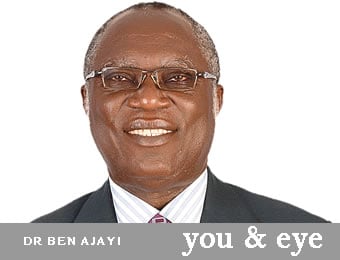The preacher asked the audience, “What do you do with your eyes?” The young boy sitting by my side whispered to no one in particular, “Isn’t he daft? What else does anyone do with his eyes if not for seeing?” I looked at him and smiled to myself. The little boy was right, but he clearly missed the point. It was pure semantics. The preacher was speaking metaphorically and the real meaning of his statement could be inferred by rephrasing the question, “Do we see the things we should see?”
A 44-year-old man walked into my office seemingly pleased with himself. Just as I was about to ask him what his problem was, he blurted out, “I am fine. I have no problems with my eyes; I see everything I am supposed to see in the distance and can read the smallest of prints even in poor light. I have only come to collect a medical report so that I can apply for a licence for firearms”.
From his body language, he didn’t expect me to do any examination, he just wanted me to write a report and hand it over to him! “Is he really seeing the things he should see? Are his eyes normal?” I set out to find out.
“Please sit on the chair yonder,” I demanded, pointing at the examination chair. He complied. I presented him with the Snellen’s chart containing a series of letters of different sizes on the opposite wall, six metres away from his seat to read. He read every letter, even the last two lines which were smaller than what a normal eye was supposed to see. I was happy with his performance. Then I gave him a near vision reading book. He could not read the smallest prints until the book was almost at arms’ length.
His excuse, “Doctor, aren’t these letters too small for the best of eyes? I have no problem reading my Bible and novels. And you won’t believe, I read at least one book per week.” “I will answer your questions later”, I said trying to save valuable time because there was a crowd of patients competing for my attention.
“You need to be careful doc,” I cautioned myself. “Are you sure that you are seeing well yourself?” It suddenly occurred to me that I haven’t had my comprehensive medical examination for over one year! I told myself, “You must do this today. You must practise what you preach and preach what you practise.”
Now back to the self-assured man, I put some drops into his eyes to dilate the pupils and have a better look at the inside of the eyes. “Oga, you have a to wait a little while to give the drops sometime to work so that I can see better.” He was a bit disturbed; his self-confidence had evaporated because he knew something was amiss.
While I was still wondering how best to break the news to him, my mind wandered to a patient I had seen on the last working day of the year. An old lady had come to see me about her glasses. There wasn’t any problem with her eyes. I asked my optician to fix her glasses. But then she made a request, “My driver has a problem seeing at night. Could you help me have a quick look at his eyes?”
The driver was standing right by her side and with her disarming smile, I knew I had to oblige. One eye was completely blind. It could not even see light! The other could read nearly everything on the chart but the field of vision was severely compromised.
“Your driver has no business being on the road even in the daytime!” I told her point blank. I sat the driver down and explained to him that he was risking his life, his boss’s and the lives of other road users. He had to commence treatment to prevent his only seeing eye from going blind.
What do you see with your eyes? Do you see the things you should see? No matter how much you try, you cannot answer these questions satisfactorily without the help of an ophthalmologist and only after a comprehensive eye examination. You need your eyes to have the best the world can give you. Pay a visit to your eye medical doctor (ophthalmologist) today and stay sighted and happy throughout the coming years.






